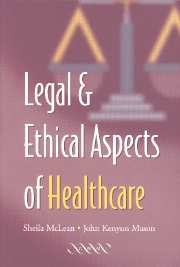Book contents
- Frontmatter
- Contents
- Acknowledgements
- Dedication
- Preface
- A Note on Abbreviations
- 1 About Medicine and the Law
- 2 Resources – Who Decides?
- 3 The Confidential Relationship
- 4 The Therapeutic Partnership
- 5 Refusal of Consent
- 6 Medical Negligence
- 7 Using People for Research
- 8 Assisted Reproduction
- 9 Genetics and Pregnancy
- 10 Termination of Pregnancy
- 11 Genetics, Insurance and Employment
- 12 Is Life Worth Living?
- 13 Disposal of the Body and Body Parts
- 14 Sex, Gender and the Law
- 15 Mental Health and Mental Capacity
- 16 The Law and the Elderly
- Index
7 - Using People for Research
Published online by Cambridge University Press: 24 August 2009
- Frontmatter
- Contents
- Acknowledgements
- Dedication
- Preface
- A Note on Abbreviations
- 1 About Medicine and the Law
- 2 Resources – Who Decides?
- 3 The Confidential Relationship
- 4 The Therapeutic Partnership
- 5 Refusal of Consent
- 6 Medical Negligence
- 7 Using People for Research
- 8 Assisted Reproduction
- 9 Genetics and Pregnancy
- 10 Termination of Pregnancy
- 11 Genetics, Insurance and Employment
- 12 Is Life Worth Living?
- 13 Disposal of the Body and Body Parts
- 14 Sex, Gender and the Law
- 15 Mental Health and Mental Capacity
- 16 The Law and the Elderly
- Index
Summary
The use of human beings as experimental subjects has a long history. The art of modern medicine has been evolving steadily over the last few centuries and every time a doctor used an innovative treatment during that time, he or she was, effectively, conducting an experiment. Isolated experimentation of this type, however, was often ill considered both in terms of its appropriateness and its consequences – as was once said:‘… we have a long history of human experimentation, and just as long a history of abusing it’.
Yet, it is widely accepted that research is an important part of modern medicine, not least because it is only as a result of research that medicine can advance, and it could be argued that a medical profession which did not seek to advance would be in dereliction of its duty. Scientific enquiry which results in developments which will benefit patients is conducted for the public good and the public, in its turn, expects that research will be carried out in the interests of improved patient care. Perhaps most significantly, medicine has become increasingly sophisticated in the last 50 years and its increasingly scientific nature has heralded the widespread development of organised experimentation, generally by way of clinical trials. The word ‘organised’ is important here, as it is the preparation of, and adherence to, a planned protocol that distinguishes true research from experimentation. This chapter will focus on the former although a brief mention of the latter will be made at the end.
- Type
- Chapter
- Information
- Legal and Ethical Aspects of Healthcare , pp. 85 - 98Publisher: Cambridge University PressPrint publication year: 2003



